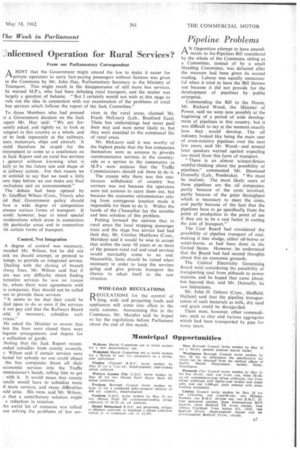Pipeline Problems
Page 41

If you've noticed an error in this article please click here to report it so we can fix it.
A N Opposition attempt to have amendments to the Pipelines Bill considered by the whole of the Commons, sitting as
a Committee, instead of by a small Standing Committee, was defeated after the measure had been given its second reading. Labour was equally unsuccessful when it tried to have the Bill thrown out because it did not provide for the development of pipelines by public enterprise.
Commending the Bill to the House, Mr. Richard Wood, the Minister of Power, said we were now possibly at the beginning of a period of wide development of pipelines in this country, but it was difficult to say at the moment exactly how they would develop. The oil industry looked like being the main user of cross-country pipelines over the next few years, said Mr. Wood—and several later speakers warned against expecting too much from this form of transport.
"Thereis an almost science-fiction wishful-thinking about the 'possibility of pipelines," commented Mr. Desmond Donnelly (Lab., Pembroke). "We must be realistic. The most likely users of these pipelines are the oil companies, partly because of the costs involved, partly because of the great throughput which is necessary to meet the costs, and partly because of the fact that the pipelines have to go specifically frorn.the point of production to the point of use if they are to be a real factor in cutting the cost of -transport."' The Coal Board had considered the possibility of pipeline transport of coal, making it-into sludge, either: oil-borne or water-borne, as had been done in -the United States. However, :he understood that the Board had had second thoughts about this On economic grounds.
The Central Electricity Generating Board were considering the possibility of transporting coal from pitheads to power stations, and he hoped that came about, but beyond that, said Mr. Donnelly, he saw limitations.
Mr. _John IL Osborn (Cons., ,Sheffield, Hallam) said that the pipeline transportation of such materials as milk, dry sand
and grain could be disregarded. .
There were, however, other commodities, such as clay and various aggregates which had been transported by pipe for many years.




















































































































